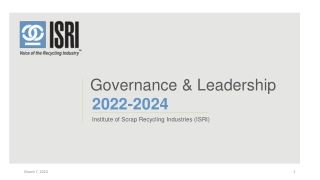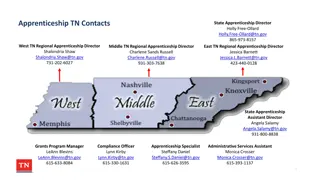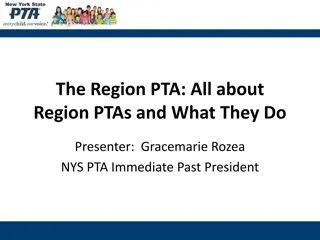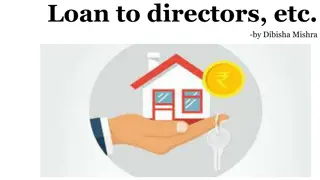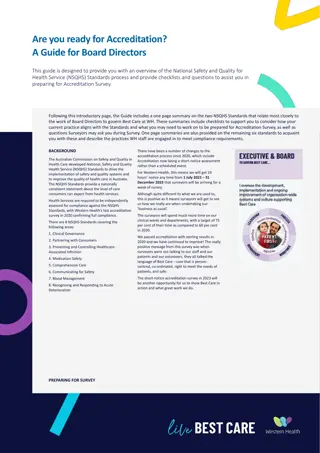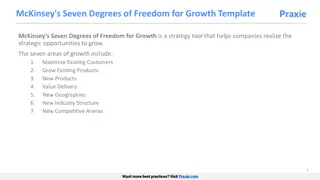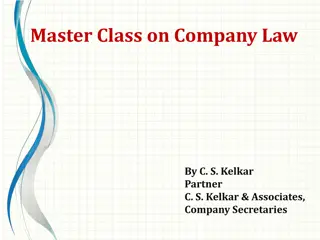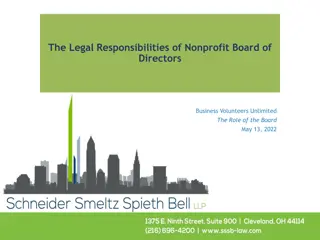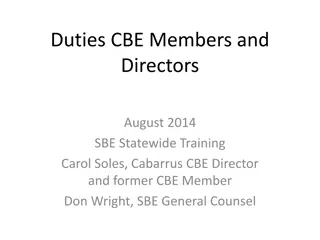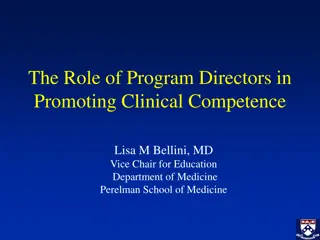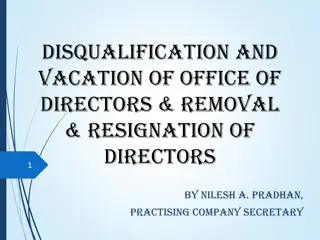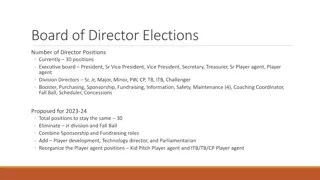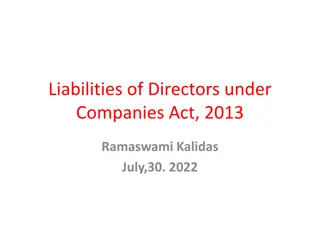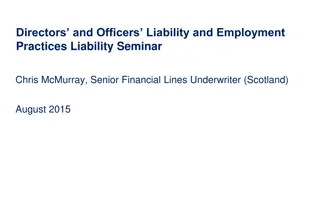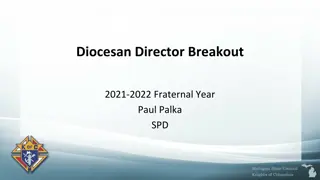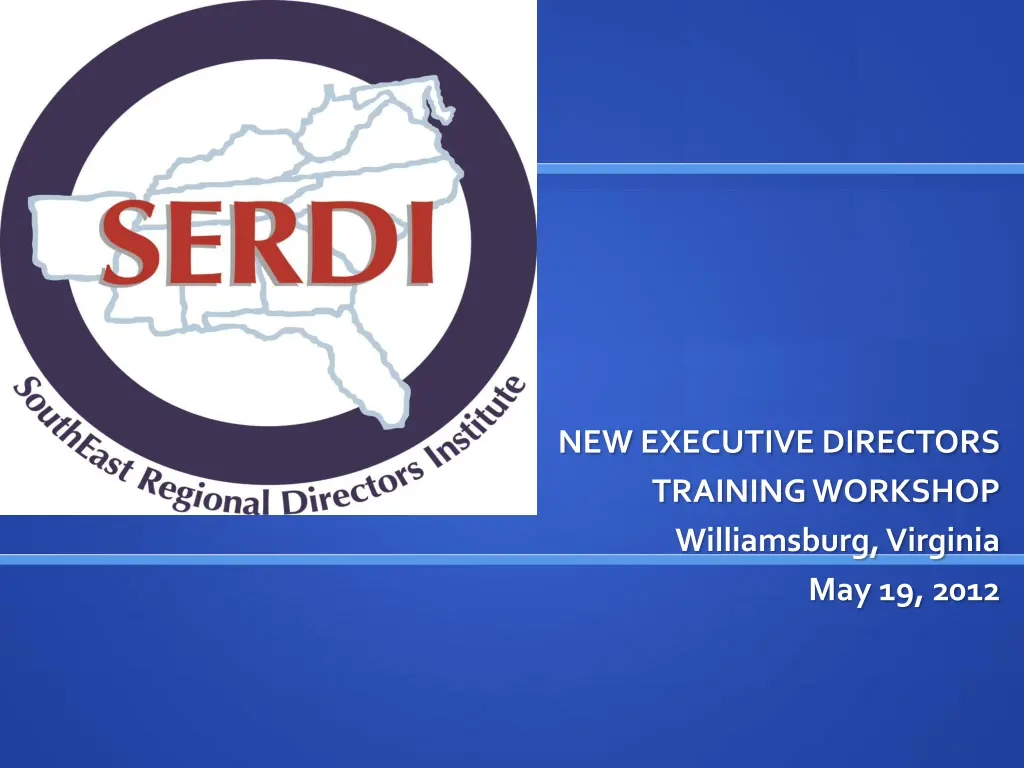
Executive Directors Training Workshop Highlights Regional Council Challenges
Discover key insights and challenges faced by executive directors in regional councils, including the importance of relevance, ownership, governance, and relationships with local and federal governments. Gain valuable perspectives on inheriting roles, staff engagement, and public-private sector engagement in public administration positions. Explore the multi-faceted skills needed for success in the dynamic landscape of regional council leadership.
Download Presentation

Please find below an Image/Link to download the presentation.
The content on the website is provided AS IS for your information and personal use only. It may not be sold, licensed, or shared on other websites without obtaining consent from the author. If you encounter any issues during the download, it is possible that the publisher has removed the file from their server.
You are allowed to download the files provided on this website for personal or commercial use, subject to the condition that they are used lawfully. All files are the property of their respective owners.
The content on the website is provided AS IS for your information and personal use only. It may not be sold, licensed, or shared on other websites without obtaining consent from the author.
E N D
Presentation Transcript
NEW EXECUTIVE DIRECTORS TRAINING WORKSHOP Williamsburg, Virginia May 19, 2012
Welcome to the Profession You hold one of 142 positions in the 12-state region. If you want it to be, it can be one of the most satisfying and fulfilling public administration positions that you could ask for To be successful, you must have multi-faceted skill set You must realize that your decisions and actions not only effect your own council and region it effects your entire statewide network of councils, and in some cases, beyond
Your Arena Regional councils are political entities that must function politically to be highly effective, yet they must also act in a non-partisan manner. Regional councils are sometimes less bold in structure and authority than a region s needs might warrant, yet more advanced than area politics comfortably accept.
What did you or will you inherit? Who did you follow? What kind of budget did you inherit what % of your budget comes from local government dollars? What is your staff s temperature? How do you gauge your owners commitment to your council? Where does your council stand with the public and private leadership entities in your region
What did you or will you inherit? What has been your biggest surprise since you sat down in the big chair?...what do you perceive it might be if you haven t sat down? What concerns do you have as the executive director or do you have as you prepare to step into the position?
Seven Significant Issues Facing Regional Councils Relevance Convener of the Region Ownership and Governance Relationship with Local Governments Relationship with State and Federal Governments Statewide Uniformity/Capacity Public Relations/Image
Relevance Does your phone ring? Are you at the table with your region s public and private sector leaders on major regional and/or local initiatives? Far too often local governments have no idea what the councils are doing or that they are not performing any function really relevant to the needs of the local government.
Relevance Councils are not always responsive to local government s needs or being involved in initiatives or programs that are of immediate benefit to the local governments Disengagement?
Convener of the Region Fostering leadership, being proactive, and making sure that the region s true leaders, both public and private, are involved in a council s mission and activities enable a regional council to be thought of as the convener of a region; as the forum if you will, a gathering spot, where the blueprint for the region s future is addressed.
Convener of the Region Are you fostering regional collaboration between local officials, plus public, private, non-profit, civic and philanthropic leaders? There is a need for the councils to become the convener or forum for their region to come together to discuss area key issues and concerns. - Councils must realize that they have to be a player in the region s activities (not the only player reference to the mention of specific purpose regional entities springing up). If councils were seen as they were intended to be the convener, the regional forum perhaps not as many regional efforts would be taking place without their participation.
Convener of the Region There is a need for more meaningful public and private sector input and involvement into issues facing regions. - Local officials, for the most part, have a very difficult time looking past the next election, and in many cases, participate at the regional council out of local government self-interest and not for what is best for the entire region.
Ownership/ Governance Who owns regional councils? Enabling legislation or executive orders putting councils in business for the most part, lay out regional councils as entities of local government. Ownership, however, in the minds of local governments, board members and the public, AND Regional Council Executive Directors, is not always so clear. Find out who owns your regional council and make sure that they know it.
Ownership/Governance Does your enabling legislation and/or executive order limit your role and functions? Is your board structured to attract the movers-and-shakers of the region? Is your regional council structured to take a holistic approach to regional development and overcome program stovepipes and turf battles?
Relationship with Local Governments Most regional councils, by law or executive order, are established as voluntary councils owned and governed by local governments HOWEVER, in many cases local officials: Are unaware of regional council functions & programs Do NOT realize regional councils are set-up to serve them Do NOT consider themselves as owners and operators
Relationship with Local Governments It is important for locally elected officials to have a complete understanding of the relationship between their local government and that region s regional council. - Since local elected officials were not elected to serve the regional council as they were city or county government, they, for the most part, do not accept ownership and more importantly, accountability for the regional council. - When they condemn their council, they don t realize they are condemning themselves.
Relationship with Local Governments Obviously, a major portion of membership is funding. Even though regional councils are locally owned, a staggering percent of the funding of councils does not come from local sources. Much of the funding comes from federal and, to varying degrees, from state sources. - Local governments receive the greatest benefit from the council and fund them the least of all funding sources. - Local governments need to decide what the council should be and if they are willing to make the financial commitment to make them work. There is no doubt, the answer should be absolutely yes . - Decide what s important instead of developing a work program based on funding to keep the doors open.
Relationship with State and Federal Governments During many of the current legislative sessions of our region, funding to regional councils has been cut, sometimes drastically. Councils must find multiple opportunities to show their relevance and dollar saving ability to help the state address key issues. If not, what will be the councils future? Regional councils must try to improve relationships and outreach with: Governors, state legislators and senior staff State departments and agencies Congressional and agency officials at the federal level, including political and career staff in the field and in Washington, DC
Relationship with State and Federal Governments In working together on a statewide basis, it is going to be important for both rural and metro councils to understand each others needs and that they have more in common than they want to admit. This is also very true within individual councils where sometimes the urban center of a region does not see the benefit of serious council participation; and, where the areas outside the urban enter don t believe they need the urban participation. A viable region needs the teamwork of both.
Uniformity/Capacity In every state the statement was made more than once that the lack of operations, size, and capabilities of individual councils was a serious barrier to the success of councils as a statewide resource. State officials participating in meetings were advocates for their states councils as mechanisms for their departments to carry out a statewide mission but said, until there are minimum standards established for every council, they cannot use councils in statewide efforts.
Uniformity/Capacity Is your state association tackling issues: Common skill sets and staff capacity (including sharing staff expertise) Peer accountability and mentoring Multi-region collaboration, including joint program delivery among regional councils Statewide outreach and branding Professional development training and mentoring, including financial management
Public Relations/Image The identity crisis that exists among most councils is, for the most part, self-inflicted. From the beginning of councils, most executive directors and staffs felt that since the councils were owned by a region s local governments, their boards and the local governments should get all the credit for anything positive that resulted for the staff s efforts. In fact, until the importance or relevance of a council is questioned, its accomplishments are not known.
Public Relations/Image Tradition of behind-the-scenes player Can NO LONGER afford to be silent partner ; Still put elected officials in public view, but also market accomplishments, resources and roles Image is/can be a real impediment for regional councils at federal, state and local levels Too often, we let others define who we are!
Public Relations/Image You must make the effort and set standards Place a high priority on professional image Develop internal capacity or outsource for expertise Focus on real world outcomes, not process Conduct focus groups to gain feedback
Public Relations/Image What is the external image of your council? Respected and valued visionary for the region Place to bring together public, private and nonprofit leaders to advance regional goals Go to resource for understanding, tapping into and securing public investments and resources Reliable program administrator of public funds Valued technical assistance provider / issue expert on broad range of issues
Public Relations/Image The state government, local governments, the public and the councils themselves perceive that councils are incapable. In some areas, this was credited continuously as being one of the reasons that states have created additional entities for specific purposes (e.g., economic development) and by-passed the existing councils. Image is cited as a real impediment to councils participating as major players in all areas of regional impact or to their ability to assure its role as conveners of their regions. - Councils need to understand their own role and express it to the Governor, Legislature, and local officials. - Councils need to do a better job of telling their story.
Use Your SERDI Network Only comprehensive regional association for professional development, technical assistance, and mental well-being support in the United States. Reach out to the SERDI Family.

